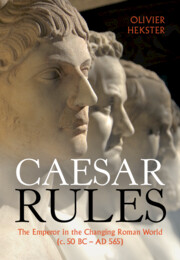Book contents
- Caesar Rules
- Caesar Rules
- Copyright page
- Dedication
- Epigraph
- Contents
- Figures
- Maps
- Graphs
- Preface
- Timeline
- Abbreviations
- Introduction
- 1 Portraying the Roman Emperor
- 2 Playing Imperial Roles
- 3 Being around the Emperor
- 4 The Emperor in the Capital and Provinces
- Conclusions
- Appendix
- Glossary
- Bibliography
- Index of Persons and Places
- General Index
2 - Playing Imperial Roles
Published online by Cambridge University Press: 23 November 2022
- Caesar Rules
- Caesar Rules
- Copyright page
- Dedication
- Epigraph
- Contents
- Figures
- Maps
- Graphs
- Preface
- Timeline
- Abbreviations
- Introduction
- 1 Portraying the Roman Emperor
- 2 Playing Imperial Roles
- 3 Being around the Emperor
- 4 The Emperor in the Capital and Provinces
- Conclusions
- Appendix
- Glossary
- Bibliography
- Index of Persons and Places
- General Index
Summary
Imperial behaviour, like the emperor’s name and image, was multifaceted, with different people expecting different things at different times. The variation was limited. A set of imperial roles – military, religious, and civil – was established rapidly and remained important throughout Roman history. There was variation of the balance between these different roles, but it was difficult for any emperor to wholly ignore any of them. Emperors could not present themselves as they saw fit. In that sense, Roman emperorship shows striking continuity. Still, the empire developed, and emperorship developed with it. Some of these shifts took place within traditional patterns. Christianity reformulated the emperor’s religious role, but did not redefine it. Child emperors were still expected to be military leaders. The move away from Rome as the emperors’ residence seems to have had a different kind of impact, diminishing the importance of some of the ‘Republican’ expectations with which Roman emperors had to cope. Yet for a Roman emperor to become exemplary, he had to satisfy different demands. Playing the right roles for relevant people was the best way to become the perfect emperor.
Keywords
- Type
- Chapter
- Information
- Caesar RulesThe Emperor in the Changing Roman World (c. 50 BC – AD 565), pp. 106 - 182Publisher: Cambridge University PressPrint publication year: 2022

